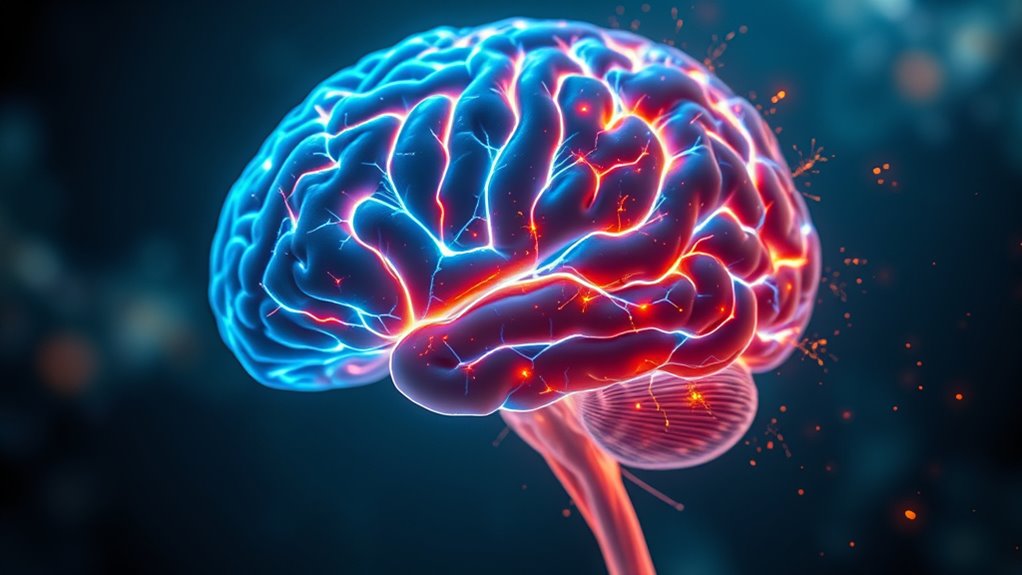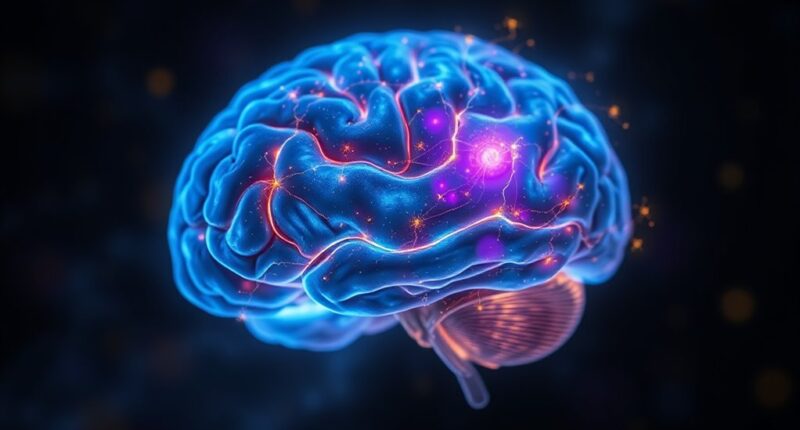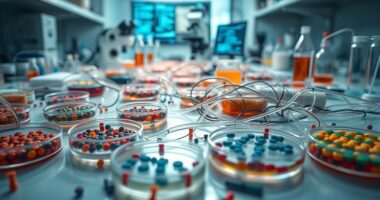During a near-death experience, your brain undergoes rapid neurochemical shifts, releasing chemicals like serotonin and endorphins that can produce feelings of peace, euphoria, and vivid visions. Neural activity becomes disorganized, especially in visual and awareness regions, creating surreal perceptions such as tunnels or bright lights. These responses may serve protective functions, heightening sensory perception and emotional intensity. If you explore further, you’ll discover how these complex brain processes shape these profound and mysterious experiences.
Key Takeaways
- Neurotransmitter surges like glutamate, serotonin, and endorphins cause vivid visions and feelings of euphoria.
- Oxygen deprivation triggers neurochemical responses that produce surreal mental states and heightened sensory perception.
- Brain electrical activity becomes disorganized, leading to altered awareness, out-of-body sensations, and intense visions.
- Protective neurochemical shifts aim to preserve neural function and help the brain cope with extreme stress.
- These complex neurochemical and neural changes create profound, meaningful experiences during near-death states.

When the brain approaches death, it undergoes rapid and complex changes that researchers are still endeavoring to understand. During this critical period, neurochemical changes occur at an accelerated pace, considerably affecting how you perceive and experience the world around you. These shifts in chemical signaling within your brain can lead to altered consciousness—a hallmark feature often reported during near-death experiences. You might feel detached from your body, see vivid visions, or experience a sense of peace, and scientists believe these phenomena are closely linked to the neurochemical upheavals taking place.
Neurochemical shifts during near-death experiences profoundly alter perception and consciousness.
As your brain’s oxygen levels drop, it responds with a cascade of neurochemical responses designed to protect and sustain neural activity as long as possible. The release of neurotransmitters like glutamate, serotonin, and endorphins skyrockets, which can temporarily enhance sensory perception and produce feelings of euphoria or tranquility. This surge of neurochemicals might explain why many people report experiencing a bright light, a sense of unconditional love, or an awareness of a tunnel—experiences often associated with the altered consciousness during these moments. The brain’s attempt to self-preserve becomes evident as it floods itself with these chemicals, creating a vivid, sometimes surreal mental state.
Additionally, research into neurochemical responses during extreme stress suggests that these chemical shifts might serve a protective or adaptive function, helping the brain cope with trauma. Simultaneously, the brain’s electrical activity becomes increasingly disorganized, which contributes to the feeling of drifting into a different state of awareness. This chaos may account for the visions and memories that flood your mind during near-death situations. In some cases, the brain enters a hyperalert state, where certain regions—like the visual cortex—become hyperactive, while others, responsible for self-awareness, diminish in activity. This imbalance can lead to the sensation of leaving your body or viewing your life from an outside perspective.
These neurochemical changes, coupled with altered consciousness, seem to serve an evolutionary purpose—possibly acting as a survival mechanism or a way for the brain to cope with extreme stress. Despite ongoing research, scientists are still piecing together exactly how these neurochemical shifts produce the profound experiences reported by those nearing death. What’s clear is that, during this critical window, your brain is actively reshaping its chemistry and neural pathways, creating an experience that feels intensely real and meaningful, even as your physical functions decline. This complex interplay of neurochemical activity and altered consciousness underscores the mysterious and fascinating nature of near-death experiences.
Frequently Asked Questions
Can Near-Death Experiences Be Scientifically Proven?
You wonder if near-death experiences can be scientifically proven. While some studies show altered brain activity and consciousness changes during these events, conclusive proof remains elusive. Researchers observe patterns, but subjective reports make it hard to verify definitively. You should know that current science can’t fully confirm or explain near-death experiences, leaving room for interpretation and ongoing investigation into how brain activity influences these profound, mysterious episodes.
Do All NDES Involve a Tunnel or Light?
Not all near-death experiences involve a tunnel or light. Many report visual phenomena, like bright flashes or distant visions, but others experience heightened sensory perception or feelings of peace without a tunnel. These variations suggest that NDEs can manifest differently based on individual circumstances. You might encounter vivid visuals or profound emotional states, but not everyone perceives a tunnel, highlighting the diverse nature of these extraordinary experiences.
Are NDES Similar Across Different Cultures?
Oh, how charming—thinking NDEs are universal, like a one-size-fits-all pillow. In reality, cultural interpretations shape these experiences, giving them unique spiritual significance. Some cultures see tunnels and lights as divine reunions, others as journeys to ancestral spheres. So, no, NDEs aren’t identical across cultures; they’re personalized spiritual stories, each reflecting where you come from and what your society deems meaningful.
What Role Do Medications Play in NDE Reports?
Medication influence and drug effects can substantially shape NDE reports. When you take certain medications, they may alter your perceptions or induce experiences that resemble NDEs, making it harder to distinguish between drug effects and genuine near-death sensations. These substances can cause hallucinations or heightened awareness, which some interpret as spiritual or transcendent moments. Consequently, understanding the role of medication influence is essential when analyzing NDE accounts.
Can NDES Predict Future Health Outcomes?
You might wonder if NDEs can predict future health outcomes. While research suggests they could have psychological impacts, like increased optimism or PTSD, the neurological mechanisms behind them remain unclear. Currently, there’s no strong evidence linking NDEs to specific future health predictions. Instead, they seem to influence your mental state and perception of life, highlighting the importance of understanding both psychological impacts and neurological mechanisms in these profound experiences.
Conclusion
During a near-death experience, your brain pushes boundaries, defies expectations, and taps into the unknown. It sparks hope, challenges beliefs, and rewires perceptions. It awakens wonder, ignites curiosity, and leaves you questioning what’s real. Your brain, in those fleeting moments, becomes a gateway—bridging life and death, science and spirituality, mystery and understanding. And in doing so, it reminds you that even in the darkest moments, there’s a flicker of light, a spark of possibility.










